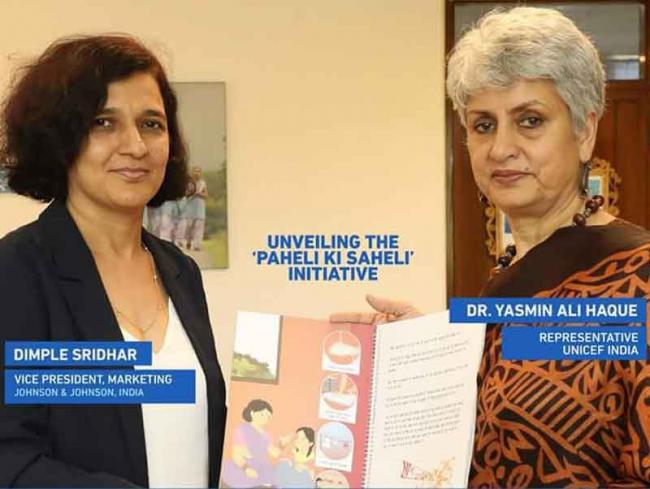
Paheli ki Saheli: Stayfree-UNICEF programme to educate adolescent girls on menstrual hygiene
Kolkata, May 31 (IBNS): Johnson & Johnson’s leading sanitary napkin brand ‘Stayfree’ and UNICEF has created an entertainment education package as a communication tool to educate adolescent girls on menstrual hygiene.
Called “Paheli ki Saheli”, the package is a tool for educating adolescent girls as well as their mothers and teachers.
It is not just a story based illustrated flipbook but also contains five short films of five minutes each, riddles, and activity based games.
Stayfree and UNICEF have been working together for six years to improve menstrual health and hygiene management among adolescent girls.
The partnership focuses on understanding key barriers to menstrual hygiene management.
It demonstrates how different social and behavior change interventions, such as interpersonal communication, social mobilization and media-based activities among key stakeholders enhance knowledge, change attitudes, build skills and encourage positive behaviors at individual, family and community levels.
The findings of a research conducted by them in a programmed area showed 93 per cent girls missed at least one or two days of school on an average due to discomfort caused from periods.
But access to sanitary napkins, information and knowledge on menstrual hygiene showed an immediate impact on school attendance as 97 per cent approved of attending school during menstruation.
In the districts where Paheli ki Saheli was implemented, a significant change in menstrual hygiene practices and therefore improvement in confidence among adolescent girls, was observed.
Dimple Sridhar, Vice President, Marketing, Johnson & Johnson India, said, “We at Stayfree believe that every girl deserves to have the opportunity to build a future that she wants. But without education, this is little more than just a dream."
"Research has shown that more girls drop out of school due to lack of knowledge on menstrual hygiene and sanitation facilities, said Sridhar. "We, at Stayfree have been continuously working towards bringing about a behavioral change with adolescent girls. And our partnership with UNICEF continues to address this reality, through educating young girls. Paheli ki Saheli is our effort in providing education and awareness to enable girls in India not to miss their school."
After the implementation of educational project, 74 per cent girls in Bihar and 76 per cent girls in Jharkhand used pads and cloth, up from 50 per cent in Bihar and 46 per cent in Jharkhand in 2013.
Adolescent girls adopted better disposal practices and they were empowered to speak openly and negotiate for better health and hygiene, while mothers and teachers also spoke freely about the issue.
According to the partners, estimates suggest that close to 110 million adolescent girls in India lack knowledge of menstrual hygiene and disposal practices, adversely affecting their education and health.
Dr Yasmin Ali Haque, Representative UNICEF India, said, “It is just not right that adolescent girls feel the need to miss school due to the pain or stain associated with menstruation. The partnership with Stayfree has created robust communication tools which have equipped girls and people in their ecosystem with necessary life skills on managing this issue."
An Indian Council for Medical Research 2011-12 report states that only 38 per cent menstruating girls in India spoke to their mothers about menstruation.
A 2015 survey by the Ministry of Education found that in 63 per cent schools in villages, teachers never discussed menstruation and how to deal with it in a hygienic manner.
Paheli ki Saheli is included in Rashtriya Kishor Swasthya Karyakram (RKSK), the national health programme targeting adolescents ages 10-19, they said in a release.
Paheli ki Saheli is an open resource and is available in the public domain (www.unicefiec.org). and Stayfree India Youtube Channel.
Image: StayfreeIndia/Twitter
Support Our Journalism
We cannot do without you.. your contribution supports unbiased journalism
IBNS is not driven by any ism- not wokeism, not racism, not skewed secularism, not hyper right-wing or left liberal ideals, nor by any hardline religious beliefs or hyper nationalism. We want to serve you good old objective news, as they are. We do not judge or preach. We let people decide for themselves. We only try to present factual and well-sourced news.







